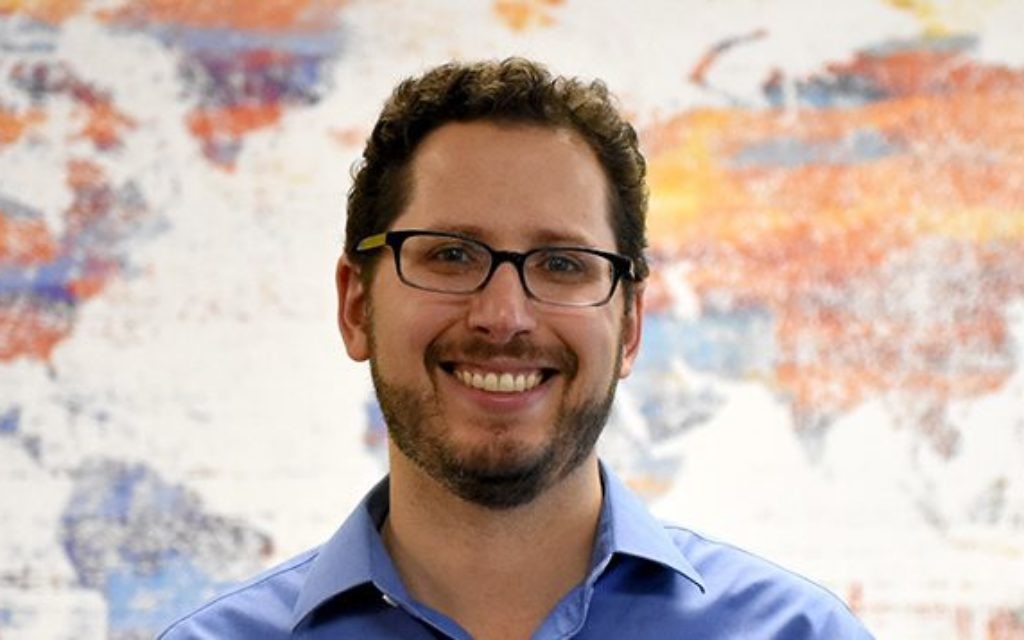Decatur’s Lubell Wins $100K Bronfman Prize
Welcoming America's founder helps communities thrive by applying the Jewish command to welcome the stranger.

Welcoming America founder and Executive Director David Lubell of Decatur has won the 2017 Charles Bronfman Prize, a global honor given to a Jewish innovator under age 50 who is inspired by Jewish values to do work of value to all people.
The prize, which includes $100,000, was announced Monday, June 19, the day before World Refugee Day.
“At a time when the U.S. and countries around the world face unprecedented polarization, David Lubell’s work creates understanding and connectivity between Americans and immigrants,” said philanthropist Charles Bronfman, the namesake of the prize established by his children. “By ensuring they are made to feel welcome in their new homes, Welcoming America shows us how we can all benefit from the resilience, talent and positive impact of these new Americans, which has forever been the experience of our nation of immigrants. I am delighted by the judges’ selection.”
Get The AJT Newsletter by email and never miss our top stories Free Sign Up
Founded in 2009, Welcoming America has spread to more than 190 U.S. communities, including Atlanta, Marietta, Clarkston, Norcross and Athens. Rather than focus on direct support to refugees and other immigrants, the organization works with U.S.-born Americans to provide a welcoming environment for newcomers.
The Decatur-based nonprofit group helps the community adjust to changing demographics, appreciate the values of immigrants, and understand the economic benefits of being a place anyone will want to live and do business. It has created the Welcoming Standard as a road map for immigrant inclusion in a community.
Lubell uses the analogy of a seed (immigrant) and soil (community). You can nurture the seed, but it won’t thrive unless you prepare the soil.
“Immigration is an emotional issue. It’s not always easy for every community to be welcoming,” Lubell said in a phone interview from Berlin, where he and his wife and 6- and 4-year-old children were vacationing while Lubell was attending a conference and meeting with Germans adopting the Welcoming America social change model.
Welcoming newcomers not only is the right thing to do morally and ethically in alignment with the Torah’s repeated command to welcome the stranger, Lubell said; it’s also a pathway to prosperity.
The model got its first test in 2006 in Nashville, Tenn., where Lubell lived while serving as executive director of the Tennessee Immigrant and Refugee Rights Coalition, which he founded. Recognizing the backlash in the city after the immigrant population quintupled in 10 years, he helped launch Welcoming Nashville to turn around the climate, and the city’s economy thrived.
After developing the concept while earning a master’s at Harvard’s Kennedy School of Government, Lubell and his wife settled in the Atlanta area to be close to her family and to be in the heart of the Southeast, the region with the fastest-growing immigrant population, to start Welcoming America.
The welcoming approach has spread because people see the benefits when businesses and families feel included, Lubell said.
Dayton, Ohio, for example, reversed 50 years of population decline and started growing its tax base after joining the program, so other Ohio cities, including Toledo, Akron and Cincinnati, signed on. One success in Michigan inspired 17 other welcoming communities.
Mayor Kasim Reed made Atlanta a welcoming community in 2013 because he saw immigrant inclusion as a civil rights issue, Lubell said, but he also recognized that his city is competing with places like Nashville and Charlotte to attract businesses.
Lubell said he is inspired in his work by the Jewish principle of tikkun olam (repairing the world) and the social justice commitment of his journalist parents and other relatives going back to his great-grandfather Samuel Lubell, one of the founders of the Reconstructionist movement. He got involved with social justice work at age 14 in Philadelphia and was set on a course of supporting inclusion when he was welcomed as an outsider teaching English for a year in Ecuador after graduating from Wesleyan University.
Winning the 14th annual prize puts the Congregation Bet Haverim member in a group that includes Israeli author and filmmaker Etgar Keret, the 2016 winner; fellow refugee advocates Rebecca Heller of the International Refugee Assistance Project (2015) and Sasha Chanoff of RefugePoint (2010); and Arava Institute for Environmental Studies founder Alon Tal (2005).
“It’s very special. It’s to me a recognition of the value of immigration and justice for immigrants in the Jewish community,” Lubell said. “We’re immigrants. We’re refugees. It makes me happy that there’s a recognition of the importance of work like that.”




comments